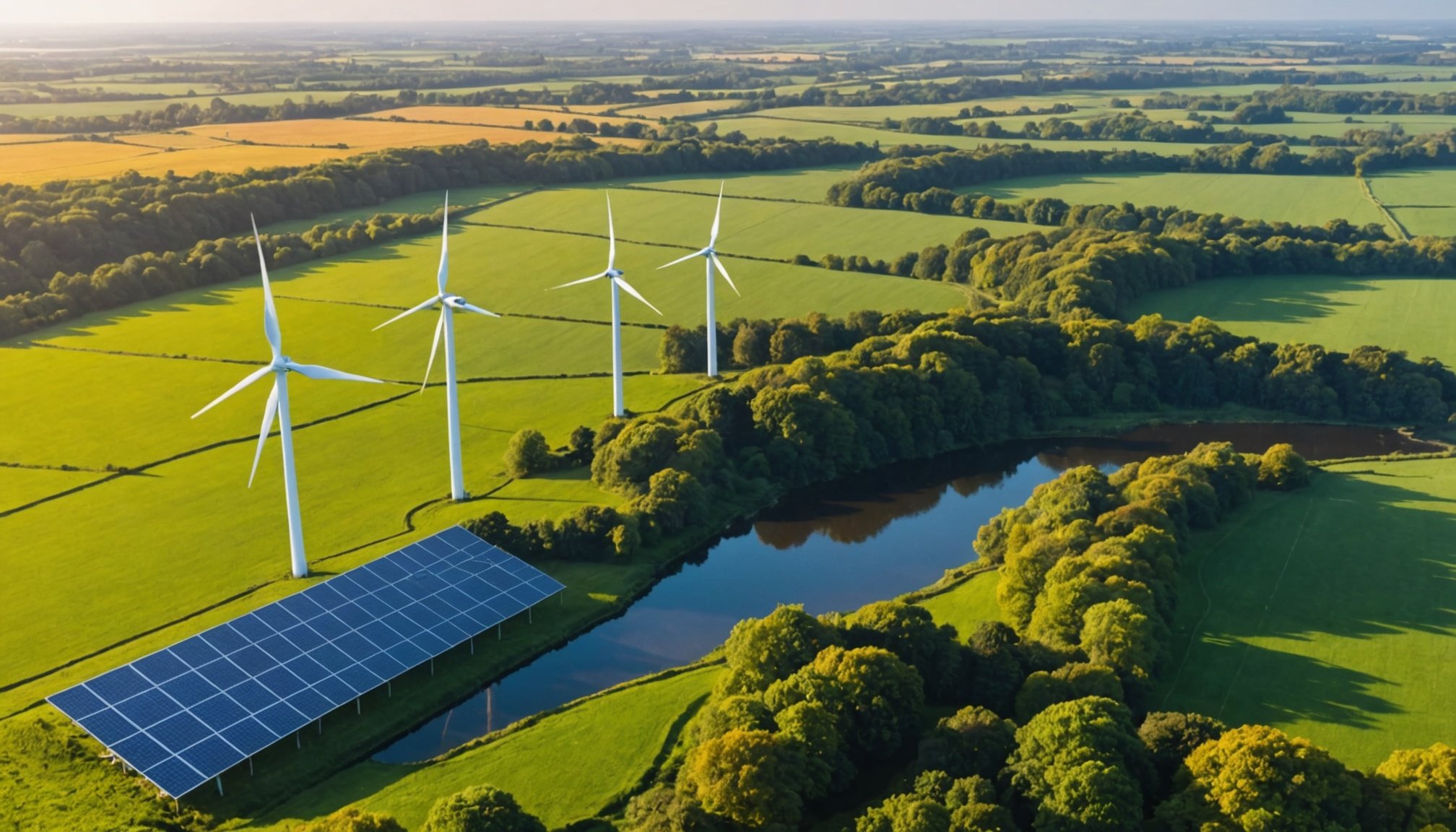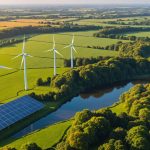Overview of Renewable Energy Trends in the UK
The UK energy market is undergoing significant transformations, heavily influenced by renewable energy trends. Historically, the UK has been a leader in adopting renewable energy, with a focus on transitioning from fossil fuels. In recent years, the push towards clean energy has intensified due to policy shifts and societal demand. Today, the landscape is characterised by a diverse mix of energy sources, with growth in wind and solar leading the charge.
The future looks promising as the UK continues to invest in future energy developments aimed at sustainability and energy security. Projections indicate that by 2050, renewable sources could account for a substantial part of the energy mix, reducing reliance on coal and gas. Understanding these market trends is crucial for stakeholders to align their strategies and enhance competitiveness.
Also to read : Discover the Pivotal Drivers Revolutionizing the UK Clean Energy Landscape in 2024
Renewable energy trends not only influence environmental policies but also reshape socio-economic structures. As the nation moves towards a greener future, staying abreast of these trends is essential for businesses, policymakers, and investors to capitalise on emerging opportunities. The commitment to sustainable practices marks a pivotal shift in how the UK approaches energy production and consumption.
Technological Innovations Driving Change
In the realm of renewable technologies, numerous advancements are fuelling a shift towards a cleaner energy future. The UK’s innovation in energy is marked by significant progress in solar, wind, and emerging technologies.
In the same genre : Transform UK Retail Inventory: Unleash Predictive Analytics for Unmatched Efficiency
Advances in Solar Energy
The journey of solar energy continues with breakthroughs in panel efficiency and storage solutions. Latest innovations are yielding high-efficiency solar panels, enhancing energy capture. Plus, community solar initiatives are gaining traction, allowing broader participation in renewable sourcing.
Wind Energy Developments
Wind energy technology is experiencing a renaissance, particularly with offshore wind farms. These innovations in wind turbine design result in heightened efficiency and reduced costs. The economic impact on local communities is palpable, creating job opportunities and bolstering local economies.
Emerging Technologies
The emergence of cutting-edge technologies like energy storage solutions and hydrogen fuel innovation is noteworthy. These offer potential in balancing supply and demand and providing cleaner energy alternatives. Moreover, decentralized energy systems empower individuals and communities to generate and manage their energy, which is crucial for scalable sustainability.
Together, these technological innovations underscore a pivotal movement in the UK’s clean energy trajectory, both today and in the future.
Policy and Regulatory Changes
In the fast-evolving UK energy policy landscape, recent government initiatives are pivotal in shaping the path towards sustainability. A key focus is the country’s commitment to achieving net-zero carbon emissions by 2050. This ambitious target has steered comprehensive legislative actions that promote renewable energy sources, aiming to minimise reliance on fossil fuels.
Post-Brexit, the UK faces unique challenges adapting to energy regulations independently of the European Union. While EU regulations previously played a significant role in shaping the nation’s energy policies, the UK’s detachment has necessitated a revamp in framework legislation. These adjustments are crucial for aligning with domestic priorities and ensuring market competitiveness on a global scale.
The regulatory landscape is thus in a state of transition, with renewable energy legislation gaining prominence. Policies encouraging investment in technologies like wind and solar power reflect the government’s vision for a sustainable energy future. Understanding the implications of these regulatory shifts is essential for stakeholders, from businesses to policymakers, to navigate the changes effectively and harness the opportunities they present in the UK’s evolving energy market.
Market Dynamics and Economic Impact
The renewable energy economics in the UK reveal a scene teeming with dynamic shifts and burgeoning opportunities. Significant investments in renewable projects have marked a notable trend, with both private and public sectors ramping up their financial commitments. This surge in investment in energy aligns with broader market trends leaning into sustainable solutions, providing robust backing for green initiatives.
Investment Landscape
Major investments underscore the growing confidence in renewable projects. Recent years have witnessed increased funding and financing strategies paving the way for energy transition. The role of the private sector is crucial, contributing greatly to innovation and infrastructure expansion. Enterprises and investors see renewable energy as a fertile ground for sustainable growth and long-term returns.
Job Creation and Workforce Development
This transition is not just beneficial economically but socially, offering new job opportunities. The renewable sector is fostering skills training and educational programs, essential for developing a qualified workforce. This workforce evolution is positively impacting local economies and communities, demonstrating the comprehensive benefits of embracing market trends within the renewable energy landscape.
Environmental and Social Implications
The shift towards sustainability in the UK’s energy framework is bringing notable benefits to the environment. Firstly, renewable energy sources substantially reduce greenhouse gas emissions, contributing to a cleaner atmosphere and mitigating climate change impacts. Additionally, by relying less on finite resources, the renewable sector promotes the conservation of natural habitats.
Community engagement is essential as public support influences project success. More communities are embracing involvement in renewable projects, leading to greater acceptance and smoother implementation. Individuals and local groups are having a say in the design and operation of installations, fostering a sense of ownership and commitment to sustainable goals.
However, concerns persist around land use and biodiversity. Renewable infrastructure, like solar farms, requires substantial space, raising issues about land allocation. Balancing energy development with ecological preservation remains a priority. Sensitive project planning and impact assessments can address these challenges, ensuring that sustainability efforts do not inadvertently harm local ecosystems.
Overall, these environmental and social dynamics underline the multifaceted role of renewables in transforming the UK’s energy landscape, marrying technological advancements with ecological responsibility and societal participation.
Future Outlook and Trends to Watch
The UK’s renewable energy future appears poised for transformation, with several upcoming trends shaping the landscape. As experts predict, the future of renewable energy lies in more integrated and innovative solutions that cater to evolving market needs.
Predictions for Emerging Market Segments
Electric vehicles (EVs) are expected to play a significant role, fundamentally altering energy consumption patterns. By 2030, EV integration could exponentially increase demand for renewables. This involves not only charging infrastructure but also solutions like smart grids for efficient energy use.
Tidal and geothermal energy are also on the cusp of expansion. With the UK’s vast coastline, tidal power is an underexplored opportunity that may contribute significantly to energy diversity. Geothermal energy, though nascent, presents potential to provide consistent energy through innovations in drilling technology.
Global Comparisons and Learning Opportunities
Globally, the UK remains ahead in some arenas but can learn from leaders like Denmark in wind energy efficiency and Germany’s solar advancements. Cross-border collaboration is crucial, opening avenues for joint research and technology exchanges that align with global standards. Opportunities for knowledge sharing will further enable the UK to solidify its stance as a leader in the renewable sector.











